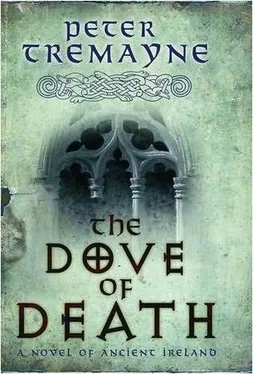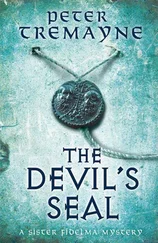Peter Tremayne - The Dove of Death
Здесь есть возможность читать онлайн «Peter Tremayne - The Dove of Death» весь текст электронной книги совершенно бесплатно (целиком полную версию без сокращений). В некоторых случаях можно слушать аудио, скачать через торрент в формате fb2 и присутствует краткое содержание. Жанр: Исторический детектив, на английском языке. Описание произведения, (предисловие) а так же отзывы посетителей доступны на портале библиотеки ЛибКат.
- Название:The Dove of Death
- Автор:
- Жанр:
- Год:неизвестен
- ISBN:нет данных
- Рейтинг книги:5 / 5. Голосов: 1
-
Избранное:Добавить в избранное
- Отзывы:
-
Ваша оценка:
- 100
- 1
- 2
- 3
- 4
- 5
The Dove of Death: краткое содержание, описание и аннотация
Предлагаем к чтению аннотацию, описание, краткое содержание или предисловие (зависит от того, что написал сам автор книги «The Dove of Death»). Если вы не нашли необходимую информацию о книге — напишите в комментариях, мы постараемся отыскать её.
The Dove of Death — читать онлайн бесплатно полную книгу (весь текст) целиком
Ниже представлен текст книги, разбитый по страницам. Система сохранения места последней прочитанной страницы, позволяет с удобством читать онлайн бесплатно книгу «The Dove of Death», без необходимости каждый раз заново искать на чём Вы остановились. Поставьте закладку, и сможете в любой момент перейти на страницу, на которой закончили чтение.
Интервал:
Закладка:
Trifina recognised the name. ‘The father of Argantken?’
‘The same. The situation is that despite sanctuary having been given, they have surrounded the abbey and are preparing to attack to take Macliau away by force and kill him. The monks are threatening them with damnation if they enter the chapel where he has taken refuge. Such threats will not keep their anger at bay for long, however.’
‘And this mob are claiming Macliau is the Dove of Death — the leader of the raiders? They are mad!’ Trifina was angry. ‘Very well. Raise your warriors and we will teach them a lesson they won’t forget!’
‘I have already despatched a dozen warriors to the abbey with Boric in command,’ Bleidbara offered. ‘I had told them to defend Macliau and the monks, but only if their lives are in jeopardy.’
Fidelma reached forward and caught the girl’s arm.
‘Calm yourself,’ she admonished. ‘Let us establish the facts. I agree we must stop this mob from visiting harm on Macliau, but we know how people are able to blame Brilhag for these attacks. In no way should you bring force to bear against these people until we have a chance to reason with them.’
Bleidbara added: ‘We need to keep warriors here in case this is a trick to make us leave Brilhag unguarded and Riwanon unprotected.’
‘I am not concerned with Riwanon’s safety but that of my brother,’ snapped Trifina. She thought for a moment. ‘We will take these men,’ she pointed to the warriors who had accompanied her from Govihan, ‘and ride for the abbey.’
‘Can you give Eadulf and me horses?’ asked Fidelma. ‘We need to come with you.’
Eadulf gave an inward groan. The idea of confronting an angry mob with a few warriors and two women was not his idea of being prudent.
As they made their way into the fortress, Bleidbara was already shouting orders for horses to be saddled. Budic agreed to command the warriors remaining in Brilhag.
It was as they were riding out of the gates of the fortress that something made Fidelma glance back over her shoulder. Standing on the steps before the great hall, watching their departure, was Iuna. For a moment, Fidelma contemplated reining in her horse and turning back to question the girl, but she was swept along in the group of riders, whose priority was to get to the abbey. The mystery of Iuna would have to wait.
The ride to the abbey of the Blessed Gildas was accomplished at breakneck speed. Bleidbara and a warrior led the way, Trifina and Fidelma came next, then Eadulf, with two warriors behind him. The pace of Eadulf’s mount was thus forced by those in front and behind, so that Eadulf, as bad a horseman as he was a sailor, simply clung to his mount and hoped for the best. His headache had returned and the events of the day seemed to be overtaking him. Already the summer day was drawing to a close, the sky darkening. Could it have really been only this morning that he had set out in a sailboat with Fidelma?
The small band of riders raced through the thick forests along the track which led across the peninsula from Brilhag directly to the abbey buildings. As they neared the abbey, the sound of raucous shouting could be clearly heard.
Bleidbara slowed the pace and the party trotted through outlying buildings into the quadrangle that lay before the chapel of the community.
The mob was not as big as Eadulf had expected, though it was big enough. There were some forty or fifty people gathered in front of the chapel steps, all of them men, waving an assortment of weapons, mainly agricultural implements, and burning torches. They were sturdy men who, from their appearance, laboured on the land. Around the front of the chapel, weapons at the ready, a few warriors stood facing them, obviously the men that Bleidbara had sent on before.
In front of them, hands held up in supplication, as if trying to quieten the mob, stood Brother Metellus. Some of the other religious of the community stood nervously by him.
Bleidbara, at a quick trot, swung his group of riders around the mob — who started to yowl with derision when they saw them. The warriors dismounted swiftly, one grabbing the horses and leading them to a secure place at a rail by the side of the chapel before rejoining his companions. They reinforced the line of stoic men facing the crowd. Bleidbara led Trifina, Fidelma and Eadulf behind to where an anxious Brother Metellus was standing.
‘There will be no reasoning with this crowd much longer,’ the Brother said.
‘Tell us the story as quickly as you can,’ Fidelma said. ‘What has happened?’
‘Macliau came running into the community. He was in a bad condition — bleeding from some wounds, his clothes dishevelled. On his heels came some of these people.’ He jerked his head towards the mob. ‘They wanted to kill him. They accused him of being a murderer and thief, saying he is the leader of raiders who have been attacking their settlements for the last week. Macliau demanded sanctuary in our chapel and I took the decision to give it to him, now that the Abbot no longer lives.’
‘Where is my brother?’ Trifina demanded.
‘In the chapel behind us,’ replied Brother Metellus.
Without another word, Trifina turned and went inside.
Fidelma frowned as she surveyed the angry crowd.
‘From half a dozen men, over the last few hours, the mob has grown,’ Brother Metellus told her. ‘Any moment, they will have gathered enough courage to brush us aside.’
‘I am told someone called Barbatil leads this crowd. Who is he?’
Brother Metellus cast an eye towards the front of the mob.
‘That man there.’ He pointed to a middle-aged, stocky and muscular-looking man, with greying hair. He was weather-beaten, though his cheeks showed a ruddy complexion. His garb and appearance clearly revealed him to be a farmer.
‘I need you to come with me as interpreter,’ said Fidelma. She glanced at Eadulf. ‘Stay here. Only Brother Metellus and I will go forward.’
Then, without another word, Fidelma went down the few steps to the front of the crowd. Brother Metellus was clearly not happy, but dutifully followed at her shoulder.
The crowd grew silent and even fell back a little as she came forward with apparent confidence. Fidelma went straight to the man Brother Metellus had pointed out.
‘I am told that your name is Barbatil and that you accused Macliau, the son of the mac’htiern of Brilhag, of murder,’ she said without preamble.
Brother Metellus duly translated this.
The stocky farmer’s eyes narrowed. There was anger in every fibre of his body.
‘I am Barbatil, and I accuse him. We will have vengeance!’
‘If your accusation is proved, then you shall have justice,’ replied Fidelma. ‘But this is not the way to secure it.’
‘What do foreigners know about the injustices that are happening here?’ replied the farmer. He pointed to Brother Metellus. ‘He is from Rome and God alone knows where you are from!’
Fidelma advised him that she was a lawyer in her own country of Hibernia and went on: ‘It is the custom among all civilised countries to state your evidence when you accuse somebody.’
‘You should know that during the last two weeks, warriors have been raiding our farms and settlements. They sail in a ship bearing the flag of the mac’htiern above it — the flag of our lord of Brilhag, who is supposed to be our protector — not our persecutor!’
‘Anyone can raise a flag,’ pointed out Fidelma. ‘Is that your only evidence?’
The farmer seemed to grow even angrier.
‘It is not. The young lord, Macliau,’ he almost spat the name, ‘has a reputation here. No man’s daughter is safe. He takes his pleasures and we have to pay for them.’
Читать дальшеИнтервал:
Закладка:
Похожие книги на «The Dove of Death»
Представляем Вашему вниманию похожие книги на «The Dove of Death» списком для выбора. Мы отобрали схожую по названию и смыслу литературу в надежде предоставить читателям больше вариантов отыскать новые, интересные, ещё непрочитанные произведения.
Обсуждение, отзывы о книге «The Dove of Death» и просто собственные мнения читателей. Оставьте ваши комментарии, напишите, что Вы думаете о произведении, его смысле или главных героях. Укажите что конкретно понравилось, а что нет, и почему Вы так считаете.











